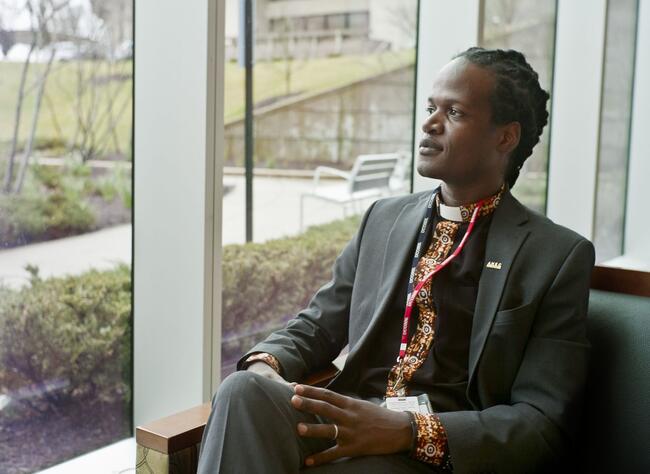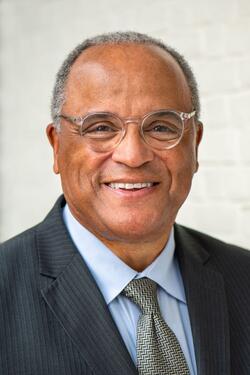By Timothy Cahill ’16 M.A.R.
Cecil “Ngoni” Tengatenga ’16 M.A.R., ’20 S.T.M. learned early in life the vital link between faith and social welfare. When he was growing up under a dictatorship in Malawi, his country relied on religious organizations to provide much of its health care, education, and other social services. Today, as Associate Director of the Connecticut Area Health Education Center (CT AHEC) and an Episcopal priest, Tengatenga oversees programs that promote interdisciplinary education among the various health disciplines, programs he believes should be elevated by the inclusion of spiritual care.
 Through his work, Tengatenga seeks to build what he calls a “spiritual healthcare workforce.” Traditional healthcare curriculums, he said, are often “missing the faith-based stuff, the spiritual care. A lot of programs don’t have it integrated, but that’s the thing that many patients, particularly those who are coming from oppressed or marginalized communities, are craving the most.”
Through his work, Tengatenga seeks to build what he calls a “spiritual healthcare workforce.” Traditional healthcare curriculums, he said, are often “missing the faith-based stuff, the spiritual care. A lot of programs don’t have it integrated, but that’s the thing that many patients, particularly those who are coming from oppressed or marginalized communities, are craving the most.”
“The role of religion was important and very pronounced in my upbringing,” said Tengatenga. He was born in 1987, when Malawi was still in the grip of dictator Hastings Kamuzu Banda, who held power in the southeastern Africa country from 1964 to 1994. With the government’s attention focused on maintaining the leader’s repressive power, it often fell to independent, faith-based organizations to provide basic social services. At the time, more than half of Malawi’s hospitals and clinics were sponsored by faith-based institutions, as were the private religious academies that provided alternatives to the propagandist curriculum of the public schools.
“When I was growing up,” said Tengatenga, “60 percent of the social services were controlled by churches or mosques or whatever religious group was around. Faith really was the common feature. It drove how we looked at life, how we experienced life.”
After high school, Tengatenga came to the U.S. to attend Trinity College in Hartford, where he received a B.A. in Interdisciplinary Science and Literature. At the encouragement of the college’s then-chaplain, Allison Read ’97 M.A.R., ’03 M.Div., Tengatenga enrolled at YDS intending to earn an M.Div. A family crisis compelled him to take the M.A.R. degree instead. He was granted special consideration to pursue a Master of Sacred Theology, which allowed him to complete courses required for ordination.
‘Jesus and the Disinherited’
While at YDS, Tengatenga deepened his interdisciplinary practice, taking several classes at the Yale School of Public Health and completing Education Leadership Ministry program and an internship in community psychiatry at the Connecticut Mental Health Center. But perhaps no course or program was more formative than Frederick “Jerry” Streets’ long-running Ministry and the Disinherited, a semester-long examination of Howard Thurman’s seminal 1949 book Jesus and the Disinherited.
In the course, Streets challenges students to grasp the complexity of being “disinherited” and reflect on the practice of ministry as it relates to people experiencing oppression, marginalization, or other cultural pressures—populations Thurman describes as “having their backs against the wall.” This was the condition Jesus faced in his lifetime, and the book is an extended meditation on how he negotiated hardship both ethically and strategically.
“We normally think of marginalized people as people of poverty and, broadly speaking, women, people of color, and the LGBTQ+ community,” said Streets, Adjunct Associate Professor of Divinity and Social Work at YDS, “and that is a central cohort. But there are larger ways to look at disinheritedness. We focus on teasing out different ways of understanding and therefore responding [to others], given the area of ministry, either ordained or lay, that the students feel themselves being led to.”
Thurman and Streets brought Tengatenga to an existential crossroads.
“The course completely transformed my sense of vocation,” he said. “Jerry’s class forced me to wrestle more deeply with what it means that Jesus was a real person. He was a Palestinian Jew living under Roman occupation. Part of what he was responding to was the violence that was going on during his time, and he came and offered as a response love of neighbor and God. Wow. It caused me to touch on hypocrisies that I had in myself, about things that I thought I was doing, calling them faith, all the mystical stuff that we try. But no—what Jesus was teaching has practical applications. Love of neighbor. When you see someone else is poor, what are you doing? It was so powerful.”
By semester’s end, the force of both the text and the professor had pointed the young Malawian to his career path.
“Jerry is a minister and an educator, and also a trained social worker. For me, that was the [inspiration] to enter healthcare. I thought, ‘You can be an ordained minister, versed in theology, teach at a seminary, and do the work he does?’ I said to myself, I want to go do that.”
In July 2023, Streets was named coordinator of the joint-degree program in Divinity and Social Work offered by YDS with the University of Connecticut. The program allows students to earn a YDS degree and Master of Social Work in tandem, preparing them for human services positions. While Tengatenga did not pursue a social work degree, his position at CT AHEC, which is located at the UConn Medical School’s main campus in Farmington, touches many of the same issues.
Tengatenga has begun to discuss with Streets the idea of including YDS students in CT AHEC’s long-running Urban Service Track (UST) program, an initiative that creates teams of health-care students to provide preventative and primary care to Connecticut’s urban underserved communities. The two-year cohorts work together to learn interprofessional leadership in homelessness programs, senior centers, health departments, and wellness clinics. The students are drawn from the UConn Schools of Pharmacy, Nursing, Medicine, Dental Medicine, and Social Work, as well as Quinnipiac University’s Physician Assistant Program.
Cultural humility
Tengatenga envisions adding a seventh health profession to the UST group, chaplaincy scholars drawn from the Divinity School’s Clinical Pastoral Education training.
Chaplains, he observes, are spiritual health providers uniquely qualified to bring to patients the quality of “cultural humility.” The term implies a fine-grained level of empathetic disposition to regard all people as individuals. The idea of “humility” stands in contrast to the widely accepted construct of “cultural competence,” the capacity to work equitably with racial and ethnic groups from many backgrounds. While cultural competence works to undermine pernicious majority-group assumptions and biases, it can also lead practitioners to define patients primarily by their “marginalized” status.
“I can assess your [cultural] competency,” Tengatenga said. “You’re either good at talking to immigrants coming in from other countries or you’re not.” But he notes that the language of cultural competency assumes that only peoples of certain groups require specific sensitivities. “It assumes that it’s only certain people we need to be attentive to.”
“But what if a patient is white and grew up in a town where the factories left and their whole life they’ve felt marginalized and isolated? When they come to a healthcare facility like this, they require the same disposition of cultural humility. It’s another way of saying that everybody is wrapped up in the problem. It’s not just Black folks, immigrants. It’s everyone.
“To provide optimal care, we need to make sure the professionals treat everyone the same. Seminary training, at its very best, allows you to do that with people.”
 As Streets views it, “Humility is valuing and seeing and affirming one’s own culture, but also doing the same thing for other cultures. The humility is when you don’t approach another culture with a sense of superiority or inferiority.
As Streets views it, “Humility is valuing and seeing and affirming one’s own culture, but also doing the same thing for other cultures. The humility is when you don’t approach another culture with a sense of superiority or inferiority.
“That’s at the heart of Howard Turman in Jesus and the Disinherited,” said Streets, who also sees potential in a collaboration between YDS and Tengatenga’s Health Education Center. “Thurman describes the life and culture of Jesus as one that was oppressed because Roman culture was seen as superior. That’s where culture humility comes in. It’s an affirmation of self and others, particularly others who are perceived as being different than ourselves.”
Timothy Cahill ‘16 M.A.R. writes on religion and art.